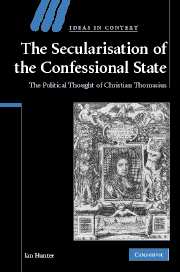Book contents
- Frontmatter
- Contents
- Preface
- Acknowledgements
- Introduction
- Chapter 1 Religion, politics and the university
- Chapter 2 The reform of philosophy
- Chapter 3 Natural law as political psychology
- Chapter 4 Staatskirchenrecht: the religious rights of the prince
- Chapter 5 The toleration of heretics
- Appendix: On the right of Protestant princes regarding heretics
- Index
Chapter 1 - Religion, politics and the university
Published online by Cambridge University Press: 22 September 2009
- Frontmatter
- Contents
- Preface
- Acknowledgements
- Introduction
- Chapter 1 Religion, politics and the university
- Chapter 2 The reform of philosophy
- Chapter 3 Natural law as political psychology
- Chapter 4 Staatskirchenrecht: the religious rights of the prince
- Chapter 5 The toleration of heretics
- Appendix: On the right of Protestant princes regarding heretics
- Index
Summary
We have argued that Thomasius's thought and writings did not unfold on the basis of a fundamental philosophy but as programmatic interventions into a particular set of religious, political and cultural circumstances. Drawing on intellectual sources that appear heteroclite and ambivalent to modern eyes, his thought found strategic coherence in the way that he shaped these sources to meet the circumstances that confronted him. Before discussing his writings in more detail, then, and as a means of orienting our approach to them, we need to clarify these circumstances. What was it about the religious, political and cultural situation in late seventeenth-century Saxony and Brandenburg that made it possible for a law professor to make such spectacular interventions into the problem of the political governance of religion?
Pointers to an answer can be found in a composite work that Thomasius published in 1717, as he approached the end of his career and life. This work consisted of the full text of Melchior von Osse's political testament, composed for the Elector August of Saxony and first published in 1555, to which Thomasius added an extensive commentary for the use of his law students at Halle. Written in his capacity as chancellor of Saxony, Osse's work is deeply indebted to the moral advice genre of the Fürstenspiegel, or ‘mirror for princes’.
- Type
- Chapter
- Information
- The Secularisation of the Confessional StateThe Political Thought of Christian Thomasius, pp. 21 - 50Publisher: Cambridge University PressPrint publication year: 2007

